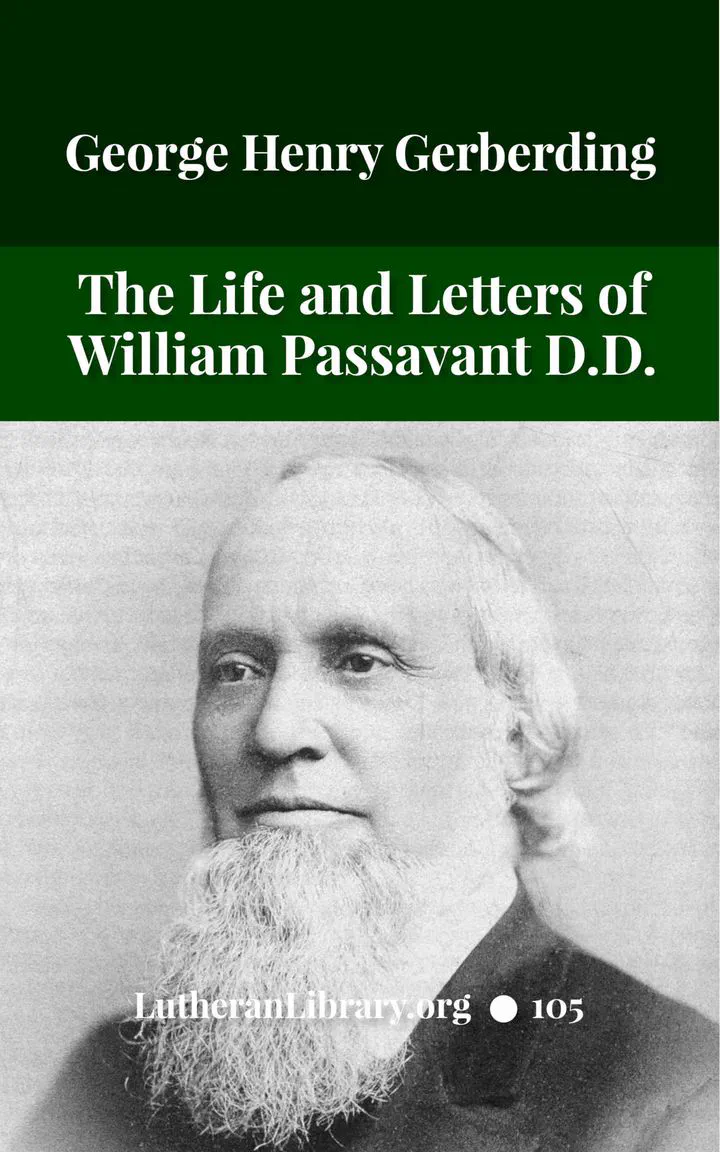The Life and Letters of William Passavant D.D. by George Henry Gerberding

“The Life of Dr. Passavant should have been given to the Church at least a decade ago… Such lives are lived for others. They are not over when those who lived them are gone, but being dead they yet speak. The stories of these saints are written for our inspiration, for our warning and for our comfort. If posterity is to have the benefit of such lives, their story must be written. It ought to be written while the memory of the heroes is still fresh and the heart still warm towards them.”
“Few lives have been so eminently beautiful and attractive, so useful to others, so many-sided, so helpful to the Church and so signally owned of God as the life of Dr. Passavant.” — Rev. George Gerberding
George Henry Gerberding studied under Charles Krauth and C. F. Schaeffer and assisted the Rev. Passavant. An indefatigable worker, he established and restored churches in Pennsylvania, Ohio, and Fargo, ND. His Way of Salvation in the Lutheran Church was one of the most successful books ever published by the English Lutheran Church.
Level of Difficulty: Primer: No subject matter knowledge needed.
Book Contents
- 1 The Passavant Family
- 2 The Childhood Of William A. Passavant – His Mother’s Influence
- 3 At College
- 4 In The Seminary At Gettysburg
- 5 First Charge And Work In Baltimore
- 6 Beginnings In Pittsburg
- 7 Abroad
- 8 Home Again – Controversy – Beginning Of Charity Work
- 9 Work For Scandinavians And Germans
- 10 Orphan Work
- 11 Life And Work In Pittsburg
- 12 Resigns First Church – Multiplied Labors – Gathers And Builds Churches
- 13 War – Views And Work
- 14 Storm And Stress In The Church
- 15 Work And Influence Among The Scandinavians
- 16 The Founding Of Milwaukee Hospital
- 17 Chicago Hospital – Bassler’s Death – Passavant’s Influence.
- 18 Founding Of The General Council
- 19 Orphan Work – Rochester – Zelienople – Mount Vernon
- 20 Mercy Work In Jacksonville For Epileptics — For Immigrants
- 21 Thiel College – College Life – Mountain Hospitality
- 22 Tribute To Dr. Krauth – Letters – Journeys – Reflections – Reproofs – Deliverances
- 25 The Passavant Institutions
A Family from Norway
“A family from Norway consisting of father, mother and four children, through the aid of benevolent persons at home, had obtained the means to emigrate to this country. They fared well across the Atlantic Ocean, and a little farther than Buffalo, N. Y., where the father, by accident, was caught under the wheels of a car which passed over his body and cut off his legs above the knees. The cars passed on at their usual rate, leaving the poor man to his fate on the track. The widowed mother came on West to the Norwegian settlement at Lisbon, Ill., and died of cholera the next day, leaving the four children without relatives or anyone to provide for them. The man with whom these children now live has himself a large family and is in limited circumstances. When I last preached in that neighborhood he spoke to me of the necessity of making some arrangement for their care, and I advised that some of the members divide them amongst their families until I could write whether there was still a place in the Home. The common practice out here has been to bind such children out, regardless of the character of those to whom they are given, or, in other words, to enslave them up to a certain age, a system which I hate from my very soul. We need scarcely add that we immediately wrote ’to send the children on.’” – from Chapter 11.
When Seminaries Depart from The Faith
“I feel very sad about the College Board at Gettysburg and its unaccountable action. They mean it ill for the truth, and are ready to make a constitution where none exists, in order to keep down and out the Lutheran faith; but all this will avail them nothing, so long as truth is stronger than error. Oh, how shame will cover them as with a garment a few years hence, when they see the number of students reduced on this account and that from their leading churches. This is a dead certainty. – From Chapter 22
Publication Information
- Lutheran Library edition first published: 2017-10-10
- Updated: 2019-04-16
- Copyright: CC BY 4.0